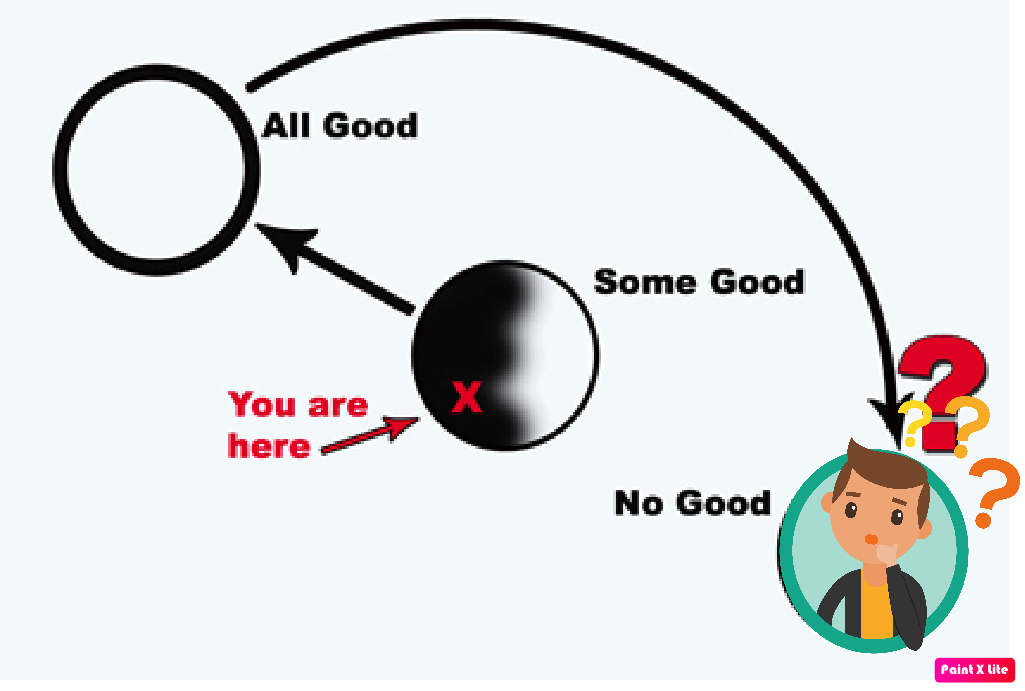Over the course of 40 comments, I’ve had a stimulating conversation with a Sam Burke in the comment section of the blog post “‘Worship Me Or Burn’ – The Oversimplification Of An Atheist Meme”. The conversation stayed on the topic for a while but eventually we somehow got onto the notion of free will, sin, temptation, and whether free will will exist in Heaven. I appealed at one point in our discussion to Dr. Tim Stratton’s “Three Circles Model” which he says solves “All the problems of evil”. I employed it in my video “The Logical Problem Of Evil – Answered” and alluded to it in my video “The Evidential Problem Of Evil – Answered”.
You’re welcome to read the brobdingnagian thread if you’d like. I do not wish to even summarize that thread here. That’s not my purpose. My purpose is to point out that I think Stratton’s model may need revision, though he may disagree.
The Planks Of The 3 Circles Model
In his blog post “3 Circles & ALL The Problems Of Evil”, Stratton lays out the “Three Circles Model,” which implies Mere Molinism along with other theological truths in the following series of “planks” (this is not to be taken as a syllogism):
a) Suffering, whether it be moral evil, natural evil, or seemingly gratuitous evil, points us to the way things ought to be (we learn from suffering and evil that it ought not be)
b) The “way things ought to be” is an eternal love relationship with God and all people in a perfect state of affairs. This is what we refer to as “Heaven.”
c) Libertarian freedom is necessarily required for true love.
d) Finite creatures who possess libertarian freedom learn over time.
e) Supernatural “zaps” of knowledge do not work. Most created beings must attain experiential knowledge (See Can God Create a Morally Perfect Creature?).
f) Adam, Eve, Satan, and a third of all the angels took suffering-free states of affairs for granted, and freely chose to “wreck” it.
g) You and I have experienced evil, suffering, and affliction — and we are aware of so much more. Because of our experiences with evil and suffering, you and I will not take suffering-free states of affairs for granted because we have genuinely learned from our experiences.
h) Because you and I have learned how stupid evil is, although we possess the same ability to “wreck” a perfect state of affairs, God created a world in which He knew that we we will always freely choose to love God and all people exactly as God intends us to for eternity. (That is to say, although we could “wreck it” and sin as Adam did, God knows that we never would or will sin into the infinite future after experiencing limited amounts of evil on earth.)
i) Some creatures have freely chosen not to learn from evil. They will be eternally separated from those of us who have.1
Sam’s Objection To The Model
Near the end of our conversation, Sam said
“Free choices are indeterministic events. There are possibilities on either side. Possibility entails at least some probability that is non-zero probability. Thus it will inevitably happen. I am not saying it is a chance event in the sense of an uncontrolled flipping of the dice. It is however, a chance in the sense that there are probabilities and possibilities. If you deny that our choices can be influenced by the desires you have in a probabilistic way (one option being made more likely for you to choose by a stronger level of temptation compared to the level of temptation for the other option) then I would ask how you could possibly explain the large amount of predictability of human volitions without resorting to determinism.
I would recommend reading Daniel Dennison Whedon’s book The Freedom Of The Will As A Basis Of Human Responsibility And A Divine Government. He has a very good explanation of why the fact that human behavior is so predictable is compatible with Libertarian Free Will. (He didn’t use that term.) And his account highly depends on the probabilities idea although many other components are added as well, but the account is hopeless as an explanation of reality without it. But regardless, my views on free will are highly, highly influenced by his work. This is why I said you are unable to choose something if you have no motive to do it. And I mean you are literally unable to choose it. The probability (and therefore the possibility) is literally zero. Of course, if you at one point had such a motive and rejected it, (or had the possibility to develop the motive and refused to develop it) your inability is self induced and therefore you are responsible for it as self induced inability is no excuse.”
Eventually, I had to admit that this is a pretty powerful response. I’ve talked to Tim Stratton about this over Messenger to see how he’d deal with Burke’s challenge (it seemed inscrutable to me). Dr. Stratton did not find the objection as compelling as I did. The issue here is that anything that is possible will have some non-zero probability of occurring (whether it be extremely likely or extremely unlikely). And no matter how improbable something may be, given an infinite amount of time, it will eventually happen. The only things that won’t occur given infinite time are things that have absolutely no chance of occuring (a zero probability). For example, things coming into being from nothing, the creation of square circles, God suddenly stops existing (He literally just dies). None of these things will ever happen. One reason for that is that they’re logically impossible either strictly or broadly.
Stratton offered an attempted reductio ad absurdum, saying “God has the power to annihilate all creation. This means, it’s possible for God to annihilate all creation. This does not mean that God will someday annihilate all creation.”
The problem with this is that I think Sam would say that example doesn’t apply because God doesn’t have any motivation whatsoever to annihilate us all in the new creation. The only reason He annihilates anyone is because they’re unrepentant sinners (Matthew 10:28). His argument is that if one has NO motive to do something AT ALL, then one is incapable of performing that action.
And I said in the course of my conversation with Sam that not only do the redeemed have a lack of a motivation to sin (the world, the flesh, and the devil are absent), but we have very powerful motives in the other direction.
The Revision I Propose
As I’ve taken the time to think this over, I’ve come to think that Stratton’s model could possibly be revised. We don’t need to resort to his “Fallback position” having God become a cosmic magnet with us as “iron filings”.2 Stratton’s model could work, but it would indeed require a slight revision. That revision would mean giving up of PAP freedom (regarding moral choices at least) in the new creation. And we’d be left with soley sourcehood LFW. Thus, there’d be a zero probability of sin occurring. Moreover, I think the revision to Stratton’s proposal is found in Sam’s own comment. Sam said //“This is why I said you are unable to choose something if you have no motive to do it. And I mean you are literally unable to choose it. The probability (and therefore the possibility) is literally zero. Of course, if you at one point had such a motive and rejected it, (or had the possibility to develop the motive and refused to develop it) your inability is self induced and therefore you are responsible for it as self induced inability is no excuse.”//
.
Perhaps by having endured this horrible world and experienced so much evil, suffering, sin, what it’s like to be without God, et. al. that when we experience the renewed Eden, our motivation to avoid going back to a world like that is so extremely powerful and overwhelming that we just could never bring ourselves to ruin the sin-free state of affairs. “Been there, done that. It was horrible.” It would be the case that introducing sin to the new heavens and earth would be impossible. It would not be compatible with our natures. We’d still have PAP freedom to do plenty of other things (play chess with the apostle Paul or Tennis with C.S Lewis), but turning our back on New Eden would not be among what we’re able to choose.
.
This has the advantage of being a SELF-INDUCED inability, like my interlocutor said. God would not render us unable by divine intervention, it would simply be that the trauma of living in a fallen world makes the idea of going back there as unthinkable as eating feces.
.
Moreover, if one believes this inability is a result of glorification, and one believes that glorification is the result of a completed process of sanctification, this is STILL a self-induced inability. And this has the advantage over my interlocutor’s proposals which we brought up during the course of our discussion because it would explain why, upon saying “Yes” to Christ, God doesn’t automatically remove our freedom to sin. Perhaps it is God’s will that one day we are as unable to sin as He is, but He wants this inability to be self induced, not done by a miraculous snap of His fingers. Now, whether or not we’d need some time post-mortem to complete the sanctification process is up for debate. Michael Jones of Inspiring Philosophy, in his video
“What is Heaven?” would extend suffering time to the intermediate state, as would philosophers like Jerry Walls.
.
Either way, we’d be unable to sin, this ability would be self-induced, and it wouldn’t be because God removed our freedom. We freely chose to render ourselves unable to sin. And, this can’t be done immediately. It has to be a process. Hence why God doesn’t just do the 1 temptation per lifetime thing.
I’m suggesting that perhaps the (h plank of his model needs revision. Instead of
h) Because you and I have learned how stupid evil is, although we possess the same ability to “wreck” a perfect state of affairs, God created a world in which He knew that we we will always freely choose to love God and all people exactly as God intends us to for eternity. (That is to say, although we could “wreck it” and sin as Adam did, God knows that we never would or will sin into the infinite future after experiencing limited amounts of evil on earth.)
We go with
h*) by having endured this horrible world and experienced so much evil, suffering, sin, what it’s like to be without God, et. al. that when we experience the renewed Eden, our motivation to avoid going back to a world like that is so extremely powerful and overwhelming that we just could never bring ourselves to ruin the sin-free state of affairs. It would be the case that introducing sin to the new heavens and earth would be impossible. It would not be compatible with our natures. We not only would not choose to “wreck it”, we cannot choose to “wreck it”.
Like a woman who cannot choose to go back to living with her abusive husband, so we could not choose to go back to living in a fallen world by choosing to sin.
Again, This has the advantage of being a SELF-INDUCED inability, like my interlocutor said. God would not render us unable by divine intervention (giant magnet – iron filings), it would simply be that the trauma of living in a fallen world makes the idea of going back there as unthinkable as a freed crackhead going back to his cocaine. He’s so thankful to be free that the mere THOUGHT of going back makes his stomach churn. So going back to coke is incompatible with his nature. He cannot choose to go back, but this inability is self induced after having freely chosen to go through the process of rehabiltation (think of this as analagous to Jesus freeing us and sanctifying us).
It also has the advantage of avoiding the infinite time/non-zero probability problem my interlocutor was pointing out.
Suppose We Don’t Need To Revise The Model?
Over the course of a somewhat lengthy conversation with Dr. Stratton over Facebook Messenger, it’s clear that he doesn’t find the objection as compelling as I found it. It is my hope that Stratton will write an article of his own on the FreeThinking Ministries website responding to this objection in depth. I would much rather prefer to keep The 3 Circles Model as it is without the need of a revision, and I’d be interested to see a thorough treatment of it from the man who developed it. However, in the event that original model doesn’t pan out, this version serves as a nice fallback position. A better fallback position than simply saying that God revokes your freedom to sin upon entrance through the pearly gates.
NOTES
1: Indirect quote from “3 Circles & ALL The Problems Of Evil”, by Tim Stratton, January 22nd 2019, —https://freethinkingministries.com/3-circles-all-the-problems-of-evil/
2: See Tim Stratton’s article “Free Will In Heaven?” – May 2nd 2017 –> https://freethinkingministries.com/free-will-in-heaven/?fbclid=IwAR30Z0eR8D_y2fOK5zuKRXk2uitiKFbqV-c1-CN1rnc8smVgzlqAk0gVZII



